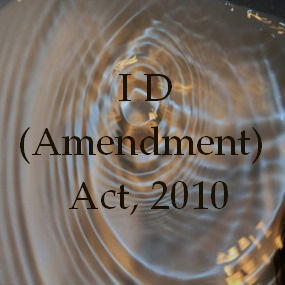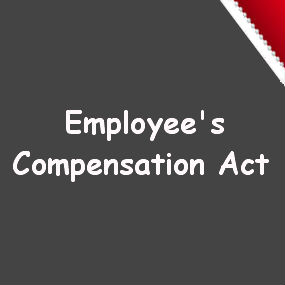68. Maintenance of registers and records and display of notices, etc., :- (1) Subject to the control of the Government an employer shall maintain such registers and records and display such notices, as may be prescribed. All such registers and records shall be kept, and all such notices shall be displayed on the premises of the establishment to which they relate.
(2) Every employer shall, on demand produce or cause to be produced for inspection by an inspector all registers, records, and notices required to be kept by or under this Act.
(3) Every employer shall submit such returns relating to his business, in such manner, within such period, and to such authority as may be prescribed.
(4) Every employer shall give an order of appointment to his employee in the establishment before such employee joins the service and shall also furnish a copy of such order to the Inspector having jurisdiction over the area, within three days of issue of each such order:
Provided that in case of an employee in the service at the commencement of this Act, the employer shall give such order of appointment within a period of three months from the date of such commencement.
69. Restriction on double employment on a holiday or during leave :- No employee shall work in any establishment nor shall any employer knowingly permit an employee to work in any establishment on a day or part of a day on which the employee is given a holiday or is on leave in accordance with the provisions of this Act.
70. Delegation of Powers :- (1) The Government may, by notification, authorise any officer or authority subordinate to them to exercise any one or more of the powers vested in them by or under this Act, except the powers mentioned in Section 71 subject to such restrictions and conditions, if any, as may be specified in the notification.
(2) The exercise of the powers delegated under sub section (1) shall be subject to control and revision by the Government or by such persons as may be empowered by them in that behalf. The Government shall also have power to control and revise the acts or proceedings of any person so empowered.
71. Power to make rules :- (1) The Government may by notification make rules for carrying out the purposes of this Act.
(2) In making a rule under sub section (1), the Government may provide that a contravention thereof shall be punishable with fine which may extend to fifty rupees.
(3) The power to make rules conferred by this section shall be subject to the condition of the rules being made after previous publication.
(4) Every rule made under this Act shall, immediately after it is made, be laid before the Legislative Assembly of the State if it is in session and if it not in session in the session immediately following, for a total period of fourteen days which may be comprised in one session or in two successive sessions, and if, before the expiration of the session in which it is so laid or the session immediately following the Legislative Assembly agrees in making any modification in the rule or in the annulment of the rule, the rule shall from the date on which the notification or annulment is notified have effect only in such modified form or shall stand annulled, as the case may be so however that any such modification or annulment shall be without prejudice to the validity of anything previously done under that rule.
72. Rights and privileges under other laws etc., not affected :- Nothing in this Act shall affect any rights or privileges which any employee in any establishment is entitled to, on the date on which this Act applies to such establishment, under any other law, contract custom or usage applicable to such establishment, if such rights or privileges are more favourable to him than those to which he would be entitled under this Act.
73. Exemption :- (1) Nothing in this Act shall apply to
(a) employees in any establishment in a position of management and having control over the affairs of the establishment, whose average monthly wages exceed sixteen hundred rupees;
(b) establishments under the Central and State Governments, local authorities, the Reserve Bank of India, a railway administration operating any railway as defined in Clause (20) of Article 366 of the Constitution and Cantonment authorities;
(c) establishments in mines and oil fields;
(d) establishments in bazars in places where fairs or festivals are held temporarily for a period not exceeding one month at a time.
(2) Nothing in Section 7 or Section 15, as the case may be, shall apply to
(a) hospitals or other institutions for treatment or care of the sick, the infirm, the destitute or the mentally unfit;
(b) such chemists and druggists shops as the Government may, by general or special order, specify;
(c) hair dressing shops, clubs and residential hotels, educational institutions, hostels attached to schools or colleges and establishments maintained in connection with the boarding and lodging of pupils and resident masters;
(d) stalls and refreshment rooms at railway stations, docks, wharves, ports, airports or but stands;
(e) establishments wholly or principally engaged in the sale of ice or aerated waters;
(f) establishments wholly or principally engaged in the sale of funeral requisites;
(3) Nothing in Sections 9, 12 or in Section 15 shall apply to
(a) person whose work is of an intermittent nature such as caretaker, sweeper, travelling staff;
(b) persons employed for loading and unloading of goods at godowns.
(4) The Government may, by notification, exempt either permanently or for any specified period, any establishment or class of establishments, or persons or class of persons, from all or any of the provisions of this Act, subject to such conditions as they may deem fit.
(5) Notwithstanding anything in the foregoing sub section, the Government may, by notification apply all or any of the provisions of this Act to any class of persons or establishments mentioned in those sub sections other than those mentioned in Clause (b) of sub section (1) and modify or cancel any such notification.
74. Application of the Workmen s Compensation Act, 1923 :- The Provisions of the Workmen s Compensation Act, 1923 (Central Act, 1923) and the Rules thereunder shall, so far as may be, apply to every employee to whom this Act applies.
75. Protection of persons acting in good faith:- No suit, prosecution or other legal proceeding shall lie against any person for anything which is in good faith done or intended to be done under this Act.
76. Power of Government to suspend provisions of the Act to during fairs and festivals :- On any special occasion in connection with a fair or festival or a succession of public holidays, the Government may, by notification, suspend for a specified period the operation of all or any of the provisions of this Act, subject to such conditions as may be specified in such notification.
77.Application of this Act Co operative Societies :- Notwithstanding any thing in the Andhra Pradesh Co operative Societies Act, 1964, the Provisions of this Act shall apply to the Co operative Societies.
78. Central Act 18 of 1942 not to apply to establishment governed by this Act :- On and from the date on which this Act comes into operation in respect of an establishment, the Weekly Holidays Act, 1942, shall cease to apply to such establishment.
79. Repeal and saving:- With effect on and from the date on which this Act is brought into force in any area, the Andhra Pradesh Shops and Establishments Act, 1966, (Act 15 of 1966) as in force in that shall stand repealed:-
Provided that-
(a) every appointment, order, rule, notification or notice made, issued or given under the provisions of the Act so repealed shall, in so far as it is not inconsistent with the provisions of this Act, be deemed to have been made, issued or given under the provisions of this Act, unless and until superseded by any appointment, order, rule, notification or notice made, issued or given under this Act;
(b) any proceedings relating to the trial of any offence punishable under the provisions of the Act so repealed shall be continued and completed as if the said Act had not been repealed but had continued in operation and any penalty imposed in such proceedings shall be recovered under the Act so repealed.









